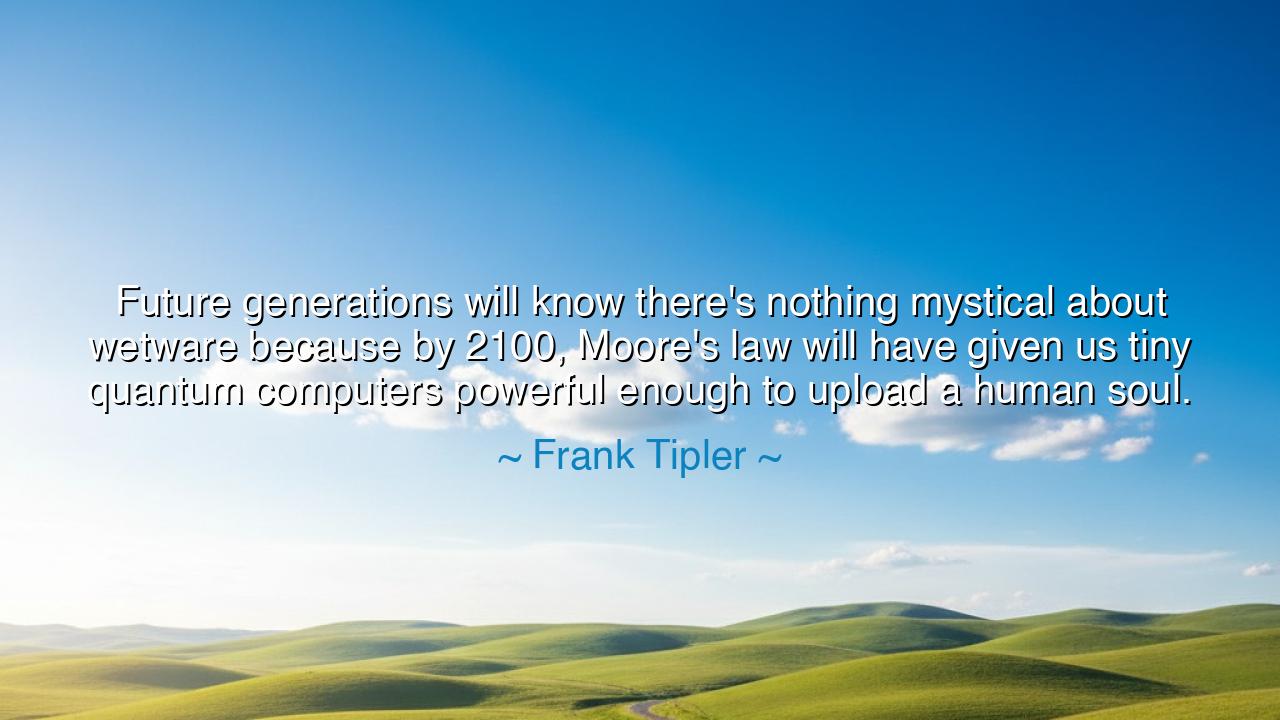
Future generations will know there's nothing mystical about
Future generations will know there's nothing mystical about wetware because by 2100, Moore's law will have given us tiny quantum computers powerful enough to upload a human soul.






"Future generations will know there's nothing mystical about wetware because by 2100, Moore's law will have given us tiny quantum computers powerful enough to upload a human soul." – Frank Tipler
In the annals of human history, there have always been those who sought to understand the very essence of life—what makes us human, what gives us consciousness, and what lies beyond the veil of death. Frank Tipler, in his futuristic vision, touches on a concept both profound and terrifying: the merging of human consciousness with the machines we have created. He speaks of a time, not far into the future, when quantum computers, born from the promises of Moore’s law, will possess the power to upload and preserve a human soul. This notion, far from mystical or fantastical, represents a new frontier in human understanding—one that challenges our very concept of life, identity, and death.
The ancient philosophers, from Socrates to Plato, sought to understand the soul as the eternal essence of the human being, an essence that transcended the physical body. In their worldview, the soul was the divine spark, connected to a higher order that governed all life. To them, the body was but a vessel, a mere shell for the soul, which could exist beyond the constraints of the material world. As human knowledge evolved, so did our understanding of the soul—moving from the spiritual and intangible to the scientific and material. Tipler’s vision suggests that in the future, the mystical nature of the soul will be dispelled, understood not as an ethereal essence, but as a computational process, one that can be captured, stored, and perhaps even immortalized through technology.
Consider the dreams of the Renaissance thinkers—Leonardo da Vinci, Michelangelo, and Galileo—who, through their insights, sought to bridge the gap between the human body and the divine. They believed that understanding the laws of nature was the key to understanding the very fabric of existence. Their work laid the foundation for the scientific revolution, which, over centuries, has gradually shifted our understanding of the soul from a divine mystery to something we might one day be able to define. Tipler’s words are an extension of this long-held human ambition: to understand, not just the mechanics of life, but the essence of consciousness itself.
The advancement of technology, particularly quantum computing, promises to unlock possibilities once relegated to the realm of science fiction. The computer—once a tool of calculation—has evolved into a complex system capable of artificial intelligence, pattern recognition, and learning. In this context, Tipler’s vision of uploading the soul might not be as far-fetched as it first appears. The quantum computers of the future, with their exponential power and ability to process vast amounts of information, could theoretically map the very structure of human consciousness. In this world, the soul would no longer be a spiritual enigma but a set of data points, capable of being stored, transferred, and perhaps even recreated.
The concept of immortality, once confined to religious texts and mythologies, takes on a new form in Tipler’s vision. The ancient Sumerians believed that Gilgamesh, the great king, sought to conquer death and achieve eternal life. Similarly, the Greeks saw the gods as immortal beings, transcending the human condition. Yet, even in these ancient tales, there was an awareness of the inevitability of death. But what if death, instead of being a finality, was simply a transition—a shift from one state of existence to another, where the human soul, once captured and digitized, could continue to exist in a new form, free from the physical constraints of the body? Tipler’s statement suggests that this transcendence could be possible not through divine intervention, but through human ingenuity and technological advancement.
In many ways, Tipler’s idea challenges us to reconsider what it means to be human. If the soul can indeed be captured and preserved in a quantum computer, what happens to the concept of identity? Are we no longer bound by the flesh, but instead live as a collection of data? Is the soul merely a complex series of patterns, waiting to be understood and transferred, or is there something more elusive, more spiritual, that eludes even the most advanced technologies? These are the questions that Tipler’s vision provokes, inviting us to confront the limits of our current understanding of consciousness, life, and death.
So, what lesson can we draw from Tipler's vision? It is a reminder of the boundlessness of human potential and the power of technology to reshape the very essence of our existence. The journey of understanding the soul is far from complete, but it is a journey that, through science and innovation, may one day be realized. However, it is also a call to humility—to recognize that even as we push the boundaries of what is possible, we must never lose sight of the deeper mysteries that lie beyond the reach of technology. In the race to understand consciousness, let us not forget that life and identity are not merely questions of data, but of meaning, purpose, and connection.






AAdministratorAdministrator
Welcome, honored guests. Please leave a comment, we will respond soon